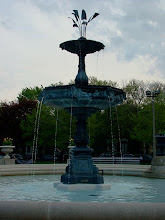Watching the news at 4 a.m. is never a good idea.
Anti-Obama sentiments, particularly in Montana, the site of the latest Town Hall Meeting, are rather disturbing. An American flag with a swastika where the stars should be, a black reporter expressing that she would have been fearful to have attended the town hall meeting, and many other citizen behaviors serve as a reminder that we haven't come as far as we think that we have.
Though an analogy to Hitler's Beer Hall meetings is most likely an extreme one, there is a grain of truth to it, and an unsettling feeling that comes whenever extremism is on the rise, perhaps felt more acutely by African Americans, and Jews, though maybe I'm just paranoid.
Around the time I had my bat-mitzvah, I became rather unpopular in my Hebrew school ethics class. The "Never Again" catch phrase, referring to the Holocaust, was all the rage, and if I recall correctly, the essay topic was, "Could the Holocaust Happen Again?"
I wrote about how never again is always now, and that history, whether we want to believe it or not, repeats itself in a vicious cycle. To look at the Holocaust as an isolated point in time, one that could have only happened with the Germans, in Germany, is not a good thing to do, because what happened in Germany could technically have happened in any country experiencing an economic crisis, and a people determined to find scapegoats. Antisemitism is as old as time, and while it sucks sometimes to be on the other end of comments from strangers, and acquaintances that smack of it, as happened again recently, I'd not trade my outsider status, or cultural ties, or the traditions I celebrate for anything, even if it means feeling a bit short of breath, and having a hard time getting that black reporter's words, and tone out of my head from the coverage I watched on TV shortly before falling asleep.
The reporter said that as a female, and an African American, she would not have wanted to be in a room of people where someone was tearing up a Rosa Parks poster. I couldn't agree more, and while I hope the Montana town hall meeting was an isolated incident, the skeptic in me wonders what other people in America are feeling right now, the ones that aren't living the big city life. The optimist in me hopes it was just a small group of right wing outsiders showing their true colors in the heart of Montana, and not indicative of a viable movement.
In other news, my boyfriend just surveyed the latest knitted blanket.
"It's not funny," he said.
"It wasn't supposed to be," I replied. "The assignment was to write a realistic scene, even if it's not funny."
"Well, it's definitely real," he assured me.
"Not funny at all?" I asked, somewhat hopefully.
Nope, he said.
I don't know why, but I think that's funny. It was fun to write anyway, regardless, though when I start to lose my sense of humor I know it's time to stop thinking so much, speaking of which, drinks are on the horizon.
Subscribe to:
Post Comments (Atom)

Aly, this is exactly what happened to Americans of Japanese ancestry when EO66 was issued. Nativists and economic greed for the lands made fertile and rich by Japanese American farmers (who were only alloted the poorest soil quality when they came here) sought to enrich their land holdings by getting rid of the competition. Fueled by previous hatred for the Chinese immigrants, Mexicans and Indians, turning on our citizens as long as they were not a part of the general population or "insiders" became a norm. It is ironic that Japanese American soldiers, most of whom came from the Internment camps and left their families and barbed wire behind in our country were the ones who liberated Dachau.
ReplyDeleteTurning on those who are different because they are different, in our country, has been an age old practice since the first attacks on our indigenous populations to take their lands, accepting that slavery was normal, that Asian Americans should be barred from becoming citizens, that it was okay to slaughter Mexicans, Chinese and Indians and African Americans. It is part and parcel why here, subcultures have were forced to be apart and separate unless they could "pass" in the history of our nation. It is also why people find it so unusual to hear that there are subcultures in Latin American countries because there, people just view others in shades of color but first always as a person of their country. Here you can have 4th generation Asian Americans still being asked where they are from, when no one would do that to someone whose ethnic heritage appears more Western European.
So we evolve, slowly. And obviously not all that evenly, as evidenced by many differences between smaller cities and towns versus major urban cities.
Well said, TC. I think that's why I am a city mouse...
ReplyDelete